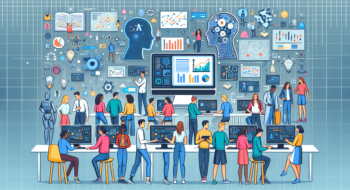Artificial Intelligence and the Future of Patient Care in Healthcare Systems
As we delve into the evolving landscape of healthcare, one cannot overlook the transformative role that Artificial Intelligence (AI) is poised to play. With innovations accelerating at an unprecedented rate, healthcare systems around the globe are beginning to harness the power of AI to enhance patient care and operational efficiency. A recent discussion featuring insights from a former chair of Alberta Health Services (AHS) sheds light on how AI is set to revolutionize healthcare.
The Current State of Healthcare and Challenges Faced
Today’s healthcare systems are inundated with challenges that strain both providers and patients. Some of the key issues include:
- High operational costs: The financial burden on healthcare systems often leads to compromised patient care.
- Employment shortages: A lack of skilled healthcare professionals creates service gaps.
- Patient data overload: The exponential growth of patient data makes effective analysis and application difficult.
These challenges underscore the urgent need for innovative solutions that can streamline processes and improve patient outcomes.
The Role of AI in Healthcare
Artificial Intelligence offers a plethora of opportunities for enhancing patient care, making the healthcare system more efficient and less costly. Here are some of the most notable applications:
- Predictive Analytics: AI algorithms can analyze vast datasets to predict patient outcomes, allowing healthcare providers to act proactively rather than reactively.
- Personalized Treatment Plans: Machine learning can help in crafting individualized treatment plans by analyzing patient history and genetic information.
- Operational Efficiency: AI can automate administrative tasks such as scheduling appointments and managing patient records, freeing up valuable time for healthcare professionals.
- Telemedicine: AI enhances telemedicine services by providing instant diagnostic support and patient triage, making healthcare accessible even in remote areas.
Impact on Patient Care
With the integration of AI into healthcare systems, patients can expect a significant improvement in the quality of care they receive. Key benefits include:
- Improved Accuracy: AI’s ability to analyze complex medical information leads to more accurate diagnoses.
- Enhanced Accessibility: Patients in remote or underserved areas can access quality care through AI-driven telehealth services.
- Real-time Monitoring: Wearable devices equipped with AI can monitor patients’ health metrics in real-time, alerting healthcare providers of any worrying trends.
- Reduced Waiting Times: Automation of routine tasks decreases waiting times in clinics and hospitals, improving overall patient satisfaction.
Challenges and Ethical Considerations
While the benefits of AI are substantial, there remain several challenges and ethical considerations that must be addressed:
- Data Privacy: With increased reliance on AI comes the responsibility of safeguarding patient data from breaches and misuse.
- Bias in Algorithms: If AI systems are trained on biased datasets, they may perpetuate inequalities in healthcare, adversely affecting certain patient groups.
- Regulatory Hurdles: Navigating the regulatory landscape can be complex, posing challenges for the deployment of AI technologies in healthcare.
Looking Ahead: The Future of AI in Healthcare
The future of healthcare is undoubtedly intertwined with the advancements in AI. Experts predict that:
- Increased Investment: Healthcare organizations are likely to invest significantly in AI technologies to improve their services.
- Collaborative Ecosystems: A synergy between healthcare providers, technology companies, and regulatory bodies will be crucial for the successful integration of AI in healthcare.
- Patient Empowerment: As AI tools become commonplace, patients will have more agency in their healthcare decisions, facilitated by better information and treatment options.
For more insights into how AI is shaping the future of healthcare, you can visit Health Affairs and explore research findings and case studies.
Conclusion
Artificial Intelligence is not just a buzzword; it represents a paradigm shift in how healthcare is delivered and experienced. By addressing current challenges, enhancing patient care, and paving the way for future innovations, AI holds the potential to redefine patient care in healthcare systems. As we move forward, stakeholders must prioritize ethical considerations and ensure that AI serves as a tool for equitable health solutions.
The integration of AI into healthcare signifies a brighter, more efficient future for patient care, and staying informed about these developments is essential for both professionals and patients alike.







